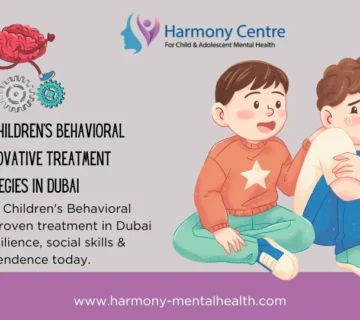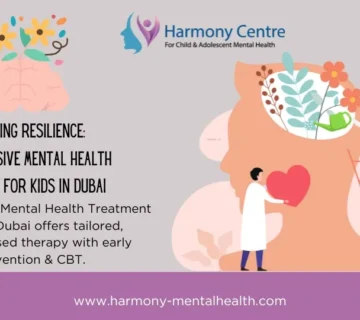Child Developmental Psychology Dubai: Understanding Your Child’s Growth at Harmony Centre
Explore child developmental psychology in Dubai at Harmony Centre. Learn how understanding developmental stages can empower parents to support their child’s emotional and mental growth.
Contact Information
| Contact Method | Details |
|---|---|
| Phone | +971 (52) 8773268 / 04 558 2015 |
| Click Here | |
| info@harmony-mentalhealth.com | |
| Address | Office 409, Building Alrazi-64C, 26th St, Healthcare City, Dubai |
Introduction
In a fast‑paced and diverse city like Dubai, every child’s development is influenced by a blend of cultural, social, and environmental factors. At Harmony Centre Mental Health Dubai, we believe that understanding developmental psychology is essential for nurturing a child’s emotional, cognitive, and social well‑being. By comprehending the stages of child development, parents and educators can identify early challenges, provide effective support, and foster an environment that promotes healthy growth. Our evidence‑based approach integrates the latest research with culturally sensitive practices to help families support their child’s journey from early childhood through adolescence.
Learn More About Harmony Centre • Contact Us
Understanding Child Developmental Psychology
What Is Child Developmental Psychology?
Child developmental psychology is the study of how children grow, learn, and change over time. It examines the various stages of development—cognitive, emotional, social, and physical—that shape a child’s behavior and capabilities. This field helps us understand:
- Milestones:
The typical achievements in areas such as language, motor skills, and social interaction. - Individual Variations:
How factors like genetics, environment, and culture influence the rate and nature of development. - Impact on Mental Health:
How early developmental experiences affect a child’s emotional resilience and behavior.
Key Developmental Stages
Understanding the milestones and transitions in child development is vital for effective support. The primary stages include:
Infancy (0-2 Years)
- Physical Growth:
Rapid motor development and sensory exploration. - Attachment:
Forming strong bonds with caregivers, which are crucial for emotional security. - Language Emergence:
Early communication through babbling and simple words.
Early Childhood (2-6 Years)
- Language and Cognitive Development:
Rapid vocabulary growth and the beginning of logical thinking. - Social Interaction:
Learning to share, cooperate, and engage with peers. - Emotional Regulation:
Starting to understand and manage feelings, though still requiring significant support.
Middle Childhood (6-12 Years)
- Academic and Social Skills:
Formal education begins, and children develop friendships and group dynamics. - Self-Concept:
Children start to form a sense of identity and self-esteem. - Problem-Solving:
Enhanced cognitive abilities enable more complex reasoning and decision-making.
Adolescence (12-18 Years)
- Identity Formation:
Adolescents explore their individuality and personal beliefs. - Abstract Thinking:
Advanced reasoning, planning, and problem-solving skills emerge. - Emotional Complexity:
Increased sensitivity to social pressures and the need for peer validation.
The Importance of Understanding Developmental Psychology
Supporting Emotional and Cognitive Growth
Understanding developmental psychology provides parents and educators with critical insights into the unique needs of children at different stages. With this knowledge, you can:
- Identify Early Signs:
Recognize delays or atypical behaviors that may indicate developmental challenges. - Implement Tailored Interventions:
Use strategies that are appropriate for your child’s developmental stage, ensuring more effective support. - Enhance Learning:
Create stimulating environments that promote cognitive development and foster a love for learning.
Strengthening Family and School Support Systems
By understanding the dynamics of child development, families and schools can collaborate more effectively:
- Consistent Support:
Alignment between home and school strategies ensures that children receive a cohesive message about healthy development. - Early Intervention:
Proactive support can prevent minor challenges from escalating into long-term issues. - Empowered Parenting:
Informed parents are better equipped to provide the emotional and practical support their children need, leading to improved outcomes.
For more insights on child developmental stages, visit the American Academy of Child & Adolescent Psychiatry (external link).
The Harmony Centre Approach to Child Developmental Psychology
Comprehensive Assessments
At Harmony Centre, our process begins with a detailed assessment designed to understand your child’s developmental profile.
Initial Consultation
- Gathering Information:
We collect comprehensive data on your child’s developmental milestones, behavioral patterns, and family background. - Parental Observations:
Parents share insights regarding your child’s communication, social interactions, and emotional responses. - Educational Feedback:
Input from educators helps us understand your child’s performance and challenges in academic settings.
Standardized Testing and Observations
- Validated Tools:
We employ scientifically‑validated assessments to measure cognitive abilities, language development, and motor skills. - Direct Observations:
Our clinicians observe your child during structured play and natural interactions to capture authentic behaviors. - Holistic Data Collection:
Combining quantitative and qualitative data allows us to create a comprehensive developmental profile.
Learn More About Our Assessment Process
Personalized Intervention Plans
Based on our assessments, we develop tailored intervention plans that support each phase of your child’s development.
Individualized Therapy Sessions
- Cognitive and Behavioral Therapy:
Tailored sessions address specific developmental challenges, such as language delays or social skill deficits. - Play and Art Therapy:
Creative therapies facilitate emotional expression and enhance cognitive development, particularly in early childhood. - Occupational Therapy:
Exercises to improve motor skills and sensory integration help children engage more effectively in daily activities.
Family-Centered Strategies
- Parental Workshops:
Our workshops educate parents on developmental milestones, effective strategies for support, and ways to reinforce therapy at home. - Family Counseling:
Involving the entire family creates a nurturing environment that supports your child’s growth. - Home Practice Programs:
Practical exercises and activities are provided for families to implement between therapy sessions, ensuring consistency and reinforcement.
School and Community Collaboration
- Individualized Education Plans (IEPs):
We work with schools to develop IEPs that address your child’s specific developmental needs. - Teacher Training:
Educators receive training on developmental psychology and effective strategies to support children in the classroom. - Community Outreach:
Collaborative programs with community organizations extend support beyond the clinical setting, promoting a culture of developmental well‑being.
Continuous Monitoring and Adaptive Support
Ongoing Follow-Up
- Regular Check‑Ins:
Scheduled follow‑up sessions monitor progress and allow for timely adjustments to intervention strategies. - Telehealth Options:
Our secure telehealth platform offers flexible, remote support for continuous monitoring. - Data‑Driven Adjustments:
Digital tools and regular assessments help us fine‑tune your child’s intervention plan, ensuring optimal outcomes.
Collaborative Feedback
- Parental and Educator Input:
Continuous feedback from parents and teachers is essential for adapting strategies to your child’s evolving needs. - Outcome Tracking:
Our multidisciplinary team uses data to measure improvements and guide further interventions, ensuring a holistic approach to development.
Explore Our Digital Resources • Get in Touch
Benefits of Understanding Child Developmental Psychology
Improved Emotional and Cognitive Outcomes
- Enhanced Learning:
Understanding developmental stages enables tailored interventions that support cognitive growth and academic success. - Better Social Skills:
Early interventions help children develop effective communication and interpersonal skills. - Stronger Emotional Resilience:
With appropriate support, children learn to manage stress and build self‑esteem, paving the way for a healthier future.
Empowered Parenting and Educator Support
- Informed Decisions:
Knowledge of developmental milestones empowers parents and educators to implement strategies that foster growth. - Early Detection of Challenges:
Recognizing developmental delays early allows for prompt, effective interventions. - Collaborative Environments:
Consistent strategies across home, school, and community settings ensure that children receive comprehensive support.
Holistic and Culturally Sensitive Care
- Personalized Interventions:
Our approach is tailored to each child’s unique needs, considering cultural influences and family dynamics. - Integrated Support Systems:
Collaboration among mental health professionals, educators, and families creates a robust network that promotes overall well‑being.
Practical Strategies for Families, Educators, and the Community
For Families
Foster a Nurturing Environment
- Establish Consistent Routines:
Use visual schedules and checklists to maintain structured daily activities. - Encourage Open Communication:
Hold regular family meetings to discuss emotions, experiences, and developmental milestones. - Engage in Creative Activities:
Incorporate play, art, and storytelling to stimulate cognitive and emotional growth.
Educate Yourself
- Stay Informed:
Read up on child developmental psychology from reputable sources to understand the stages and challenges of growth. - Attend Workshops:
Participate in our parental workshops to learn practical strategies for supporting your child’s development.
For Educators
Integrate SEL Programs in the Classroom
- Social‑Emotional Learning (SEL):
Incorporate curricula that focus on empathy, emotional regulation, and effective communication. - Interactive Lessons:
Use group activities, role‑playing, and creative projects to reinforce developmental concepts. - Collaborate with Mental Health Professionals:
Work closely with our specialists to tailor classroom strategies to the unique developmental needs of your students.
Monitor and Adapt
- Regular Assessments:
Utilize digital tools to track student progress in cognitive and social domains. - Feedback Mechanisms:
Maintain regular communication with parents and therapists to ensure consistency and address emerging challenges.
For the Community
Engage in Public Education Initiatives
- Community Workshops:
Attend and support local seminars that focus on child developmental psychology and effective parenting strategies. - Support Networks:
Join online and local support groups where families, educators, and professionals share experiences and resources. - Advocate for Inclusive Programs:
Promote community programs that offer accessible, culturally sensitive mental health care and developmental support.
Explore Our Community Initiatives
Contact Harmony Centre
Frequently Asked Questions about Child Developmental Psychology Dubai
Book a Consultation Now
Contact Information
Office Address:
Office 409, Building Alrazi-64C, 26th St, Umm Hurair 2, Dubai Healthcare City, Dubai
Phone:
+971 4 558 2015
+971 5 287 73268
Email:
info@harmony-mentalhealth.com
Final Thoughts about Child Developmental Psychology Dubai
Understanding child developmental psychology is crucial for fostering a supportive environment that promotes healthy growth. At Harmony Centre Mental Health Dubai, our comprehensive approach—rooted in evidence‑based research and multidisciplinary collaboration—provides parents, educators, and communities with the tools needed to nurture every aspect of a child’s development. By embracing early intervention and tailored support strategies, you can empower your child to overcome challenges and achieve lasting success in all areas of life.
Invest in your child’s future with expert guidance from Harmony Centre, where personalized, culturally sensitive care transforms developmental challenges into opportunities for growth.
Learn More About Harmony Centre
Get in Touch
👉 Book a Consultation Now: Call +971 4 558 2015 or visit www.harmony-mentalhealth.com.
Join our online community and stay updated with our latest events, articles about Child Developmental Psychology Dubai



